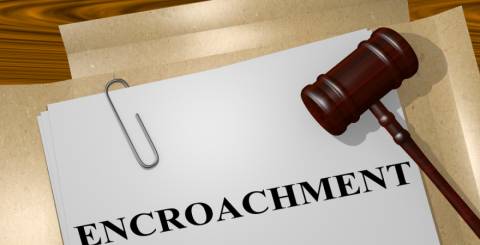How to Handle Property Encroachments in Massachusetts

Understanding property encroachments in Massachusetts is crucial for homeowners and buyers. Massachusetts law allows property owners to take civil action to remove an encroaching structure, provided they can prove ownership and successful adverse possession. Resolving disputes through negotiation is recommended, but legal options exist if necessary.
Proper identification and documentation of encroachments and disclosure during property transactions are essential. Challenges such as the statute of limitations and proving boundaries may arise, requiring assistance from legal professionals and understanding court procedures. Encroachments are always something buyers should look out for when purchasing.
Understanding Property Encroachments in Massachusetts
Property encroachments can pose legal and practical challenges for homeowners and buyers in Massachusetts. We will provide an overview of the state's relevant property encroachment laws, explore different types of real estate encroachments, discuss common causes, and highlight the potential implications of such situations.
Overview of Property Encroachment Laws in Massachusetts
Under Massachusetts law, property owners can file a civil lawsuit for removing encroachment structures. To initiate such legal action, the owner must establish ownership through professional surveys, location plans, or successful adverse possession claims. Understanding the specific legal framework in Massachusetts when dealing with property encroachments is essential.
Types of Property Encroachments
Property encroachments can take various forms, ranging from minor incursions to substantial structural intrusions. Common types of encroachments include physical structures such as fences, buildings, or additions that cross property lines and encroachments involving vegetation or utility lines. Recognizing these different types is crucial for addressing encroachment issues effectively.
Common Causes of Property Encroachments
Multiple factors can contribute to property encroachments in Massachusetts. Some common causes include inaccurate land surveying, boundary disputes between neighboring property owners, errors or omissions during property transactions, lack of clear property markers or missing boundary agreements, and misunderstandings regarding property rights and boundaries. Understanding these causes can help prevent or resolve encroachment disputes.
Potential Implications of Property Encroachments
Property encroachments can have significant implications for homeowners and buyers. These include potential legal disputes, reduced property value, interference with the owner's use and enjoyment, clouded title, financing issues, difficulties securing insurance coverage, and complications during property transactions.
Understanding the potential ramifications of encroachments is crucial to make informed decisions.
Identifying and Documenting Property Encroachments
When dealing with property encroachments in Massachusetts, it is crucial to identify and document them accurately. We will discuss surveying your property, gathering evidence of an encroachment, and proper documentation for property encroachment cases.
Conducting a Survey of Your Property
One of the first steps in identifying property encroachments is to survey your property thoroughly. Hiring a professional surveyor can help determine your property's boundaries accurately. The survey will provide an official record, including a property map, description, and existing encroachments.
Gathering Evidence of an Encroachment
To establish the presence of an encroachment, it is essential to gather concrete evidence. This can include photographs or videos showing the encroaching structure or object and its location within your property boundaries. Additionally, collecting relevant supporting documents, such as property deeds, title documents, or previous surveys, can strengthen your case.
Proper Documentation for Property Encroachment Cases
Proper documentation is crucial when dealing with property encroachments. It is essential to compile all relevant information and maintain organized records. This includes copies of survey reports, photographs, videos, property deeds, and any correspondence related to the encroachment issue. Keeping a detailed timeline of events can also be helpful.
In property encroachment cases, it is advisable to consult with legal professionals who specialize in real estate law for guidance on proper documentation and evidence collection specific to your situation. They can provide valuable insights and ensure you are well-prepared if legal action becomes necessary.
Resolving Property Encroachments Amicably
Resolving the issue amicably is often the preferred approach when dealing with property encroachments in Massachusetts. We will outline various steps and options for a peaceful resolution.
Communication and Negotiation with the Encroaching Party
Effective communication is critical when addressing property encroachments. Start by contacting the encroaching party, express your concerns, and explain the potential impact on your property. It is essential to remain calm, polite, and open to finding a mutually agreeable solution. Engage in meaningful negotiations and explore possible compromises.
Consider alternative solutions such as adjusting boundary lines, easement agreements, or sharing the cost of relocating the encroaching structure. However, it is crucial to remember your rights as a property owner and seek fair resolutions.
Drafting and Reviewing Encroachment Agreements
If a resolution is reached through negotiation, it is advisable to document the agreed-upon terms in an encroachment agreement. This written contract should clearly outline the rights and responsibilities of both parties, including any necessary actions to address the encroachment.
Consult with a legal professional experienced in property matters to ensure the agreement is comprehensive, legally binding, and protects your interests. Additionally, review the contract thoroughly before signing it to avoid any potential misunderstandings or disputes in the future.
Mediation and Alternative Dispute Resolution Options
In some cases, resolving property encroachments may require intervention from a neutral third party. Mediation can be an effective means of facilitating communication and guiding the negotiation process. Consider engaging a professional mediator specializing in property disputes to assist in finding a mutually satisfactory resolution.
Mediation can offer a less adversarial approach, providing a platform for open dialogue and encouraging mutually beneficial outcomes. Alternative dispute resolution methods, such as arbitration or collaborative law, can be explored if mediation proves unsuccessful. These options allow for a structured and guided process to resolve encroachment without resorting to lengthy court battles.
By approaching property encroachments willing to communicate, negotiate, and explore alternative solutions, amicable resolutions can often be achieved, saving time and costs and maintaining positive neighborly relationships.
Legal Options for Dealing with Property Encroachments
When facing property encroachments in Massachusetts, understanding your legal options is crucial. Here are some avenues to consider:
Filing a Lawsuit for Removal of Encroaching Structure
If you can prove ownership of the invaded property, you have the right to file a civil lawsuit to remove the encroaching structure. This requires evidence such as professional surveys, location plans, or successful adverse possession claims. It's essential to consult a legal professional to navigate the court process effectively.
Adverse Possession Claims and Their Viability
Adverse possession is a little-known legal concept in Massachusetts that can potentially allow someone to acquire land ownership if used without permission for 20 years or more. If an encroachment of boundary limits is confirmed, you have two choices.
You can either grant written permission to your neighbor to use your land if the invasion doesn't bother you, or you can issue a 'No Trespassing' order to your neighbor and, if necessary, pursue legal assistance to remove the encroachment.
Seeking Injunctive Relief and Court Orders
If negotiations fail or the encroaching party refuses to cooperate, you can seek injunctive relief through the court. This involves requesting a court order to stop the encroachment and potentially remove the structure. It's vital to gather substantial evidence, clearly demonstrate the encroachment, and consult with an attorney to present a compelling case.
Potential Remedies and Damages Available
If a court favors the property owner in an encroachment case, various remedies and damages may be available. These can include monetary compensation for any harm caused, the removal of the encroaching structure, or an order to restore the property to its original condition.
The specific remedies and damages will depend on the circumstances of each case. It's crucial to seek legal guidance and representation when dealing with property encroachments in Massachusetts to ensure your rights are protected, and the appropriate legal avenues are pursued.
Selling or Buying a Property with Encroachments
When selling or buying a property in Massachusetts with encroachments, specific considerations and steps must be followed to ensure a smooth transaction. This section will cover critical aspects of dealing with property encroachments in real estate transactions.
Disclosing Property Encroachments to Buyers
Disclosing any known property encroachments to potential buyers is crucial for a seller. This information should be provided upfront, as failing to disclose encroachments could lead to legal and financial consequences in the future.
Transparency is vital to maintaining a fair and honest transaction. When disclosing encroachments, it is crucial to provide accurate and detailed information about the nature and extent of the encroachment. This includes specifying the type of encroachment, the area of the property affected, and any actions taken or remedies considered to address the encroachment.
Negotiating Remediation or Compensation with Buyers or Sellers
Once encroachments are disclosed, buyers and sellers can negotiate potential remedies or compensation to address the encroachment. This negotiation aims to find a mutually satisfactory solution to the encroachment issue.
In some cases, buyers may be willing to accept the encroachment and proceed with the purchase if the seller offers appropriate compensation or concessions. Alternatively, buyers may request remedies such as removing the encroaching structure or correcting property boundaries before finalizing the transaction.
Conversely, sellers may negotiate compensation if buyers are willing to accept the encroachment as is. Payment can be in the form of price adjustments or agreements for the continued use of the encroached area. Documenting any negotiated agreements in writing is essential to avoid future disputes.
Involvement of Real Estate Agents and Attorneys in the Process
Real estate agents and attorneys assist buyers and sellers in dealing with property encroachments. They can provide expert guidance, ensure proper disclosure, and facilitate negotiations between parties.
Real estate agents can help identify potential encroachments during property inspections and advise sellers on disclosure requirements. They can also connect buyers with qualified real estate lawyers to provide legal assistance and protect their rights and interests.
Attorneys experienced in property law can review encroachment disclosures, negotiate on behalf of their clients, and draft legally binding agreements to address encroachments. Their expertise and knowledge are invaluable in navigating the complexities of property encroachment transactions.
- Ensure proper disclosure of property encroachments to buyers.
- Negotiate potential remedies or compensation with buyers or sellers.
- Engage the expertise of real estate agents and attorneys.
Potential Challenges and Pitfalls to Consider
Individuals should be aware of several potential challenges and pitfalls when dealing with property encroachments in Massachusetts. These include:
Statute of Limitations for Property Encroachments
It is important to note that there is a statute of limitations for property encroachments in Massachusetts. This means a specific time frame for legal action to address the encroachment. Failure to initiate legal proceedings within the designated period may result in losing rights to enforce property boundaries.
Challenges in Proving Ownership and Boundaries
Proving ownership and boundaries can be complex when dealing with property encroachments. It may require gathering historical documents, conducting surveys, and consulting with experts to establish a clear and accurate understanding of property lines and ownership. This challenge can be further complicated if there are multiple previous owners or disputed historical records.
Potential Impact on Property Value and Title Issues
Property encroachments can significantly impact the value of the affected property. Buyers may hesitate to purchase a property with encroachments, leading to decreased marketability and potentially lower sale prices.
Additionally, encroachments can create title issues, complicating future transactions or refinancing efforts.
Dealing with Encroachments in Foreclosure Situations
In cases where a property with encroachments faces foreclosure, additional challenges may arise. The process of addressing encroachments during foreclosure proceedings can be complex and time-sensitive.
It may require coordination with multiple parties, such as lenders, attorneys, and the court, to navigate the legal requirements and ensure the encroachments are appropriately addressed. Being aware of these potential challenges and pitfalls can help individuals navigate the process of dealing with property encroachments in Massachusetts more effectively.
Resources and Further Assistance
When dealing with property encroachments in Massachusetts, it is essential to have access to the right resources and assistance. Here are some key areas to consider:
Understanding Housing Court and Civil Court Procedures
Understanding housing court and civil court procedures is crucial if legal action becomes necessary. Familiarize yourself with the process, including the required documentation, filing procedures, and the overall timeline of the legal proceedings.
Recommended Resources for Property Encroachment Cases
There are several resources available to help you navigate property encroachment cases effectively. Consider the following:
- Massachusetts Bar Association: The Massachusetts Bar Association can provide valuable information on property laws, legal referrals, and resources for finding reputable attorneys specializing in property encroachments.
- Massachusetts Land Court: The Massachusetts Land Court specializes in resolving disputes related to land and property. Their website offers resources, forms, and guidelines that can assist you in understanding the legal process and requirements.
- Local Legal Aid Organizations: Local legal aid organizations can offer free or low-cost legal assistance to individuals dealing with property encroachments. Research and reach out to these organizations to explore the services they provide.
- Property Surveyors: Consulting with professional property surveyors can help you accurately determine property boundaries, identify encroachments, and gather essential evidence for your case.
- Massachusetts Real Estate Commission: The Massachusetts Real Estate Commission provides information and resources for buyers, sellers, and real estate professionals. They can offer guidance on disclosure requirements and best practices for handling property encroachments in real estate transactions.
By utilizing these resources and seeking appropriate assistance, you can better navigate the complexities of property encroachments in Massachusetts and protect your rights as a property owner.
Similar Articles
Portland, often called the "City of Roses," is where natural beauty meets a commitment to sustainability. This vibrant city in the Pacific Northwest has gained a reputation for its green lifestyle and eco-conscious culture
Metal storage building kits have become increasingly popular among property owners looking to maximize their storage space and add value to their properties. These kits offer an affordable and versatile solution for creating additional storage space without needing professional construction services.
Discover the efficiency of specialised legal searches. Uncover key information and navigate legal complexities with the power of specialised legal searches.
Moving can be an exciting time, but it can also be a stressful and expensive endeavor. It is a significant amount of work, from hiring a mover to packing to moving day. One of the major expenses when moving is purchasing moving boxes. However, there are several ways to get free moving boxes in Massachusetts, saving you money and the hassle of searching for them.
In a bustling city like Dallas, where the urban sprawl can be extensive, choosing an apartment with easy access to public transportation is a smart move for commuters.
For an outsider, the world of real estate looks impressive and genuinely easy to explore. Be that as it may, this couldn't be any further from reality. The world of the real estate sector has shown to be a complex and steadily changing business sector — one that has come so far from what it used to be only a few decades prior.
Are you in the market for a new home, but not quite ready to buy? Renting houses for rent can be a great option, but it can also be overwhelming. Where do you start? How do you find the perfect home?
Several states offer attractive opportunities when looking for affordable options to build a house in the United States. Oklahoma stands out with its cost-effective land and construction options, while Alabama compares building and buying existing homes. In Mississippi, there are budget-friendly areas for constructing houses.
Buying a house is a significant milestone in your life. No matter, if you’re a first-time buyer or an experienced landlord, buying a property, is a big deal – and you want to make sure you get it right.








